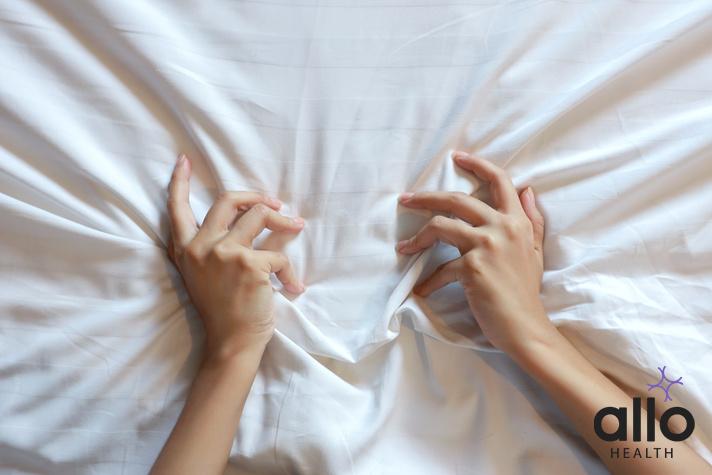7 Lifestyle Changes for Erectile Dysfunction

Allo Health is dedicated to personalized well-being, offering support and trusted information tailored to individual health goals. The platform emphasizes human-generated content, led by a distinguished medical team of experts, including physicians and sexual health specialists. Their commitment to credibility involves rigorous fact-checking, authoritative research, and continuous updates to ensure accurate, up-to-date information. Allo Health's unique approach goes beyond conventional platforms, providing expert-led insights and a continuous commitment to excellence, with user feedback playing a crucial role in shaping the platform's authoritative voice.

Dr Sanina Mansoor holds MBBS degree from Yenepoya university,Mangalore.She has 8 years of experience working as a medical officer at various health centres and medical colleges.
Why This Was Upated?
Our experts continually monitor the health and wellness space, and we update our articles when new information became available.
Updated on 10 February, 2024
- Article was updated as part of our commitment to diversity, equity, and inclusion.

"The following blog article provides general information and insights on various topics. However, it is important to note that the information presented is not intended as professional advice in any specific field or area. The content of this blog is for general educational and informational purposes only.
Book consultation
The content should not be interpreted as endorsement, recommendation, or guarantee of any product, service, or information mentioned. Readers are solely responsible for the decisions and actions they take based on the information provided in this blog. It is essential to exercise individual judgment, critical thinking, and personal responsibility when applying or implementing any information or suggestions discussed in the blog."
Erectile dysfunction (ED), often referred to as impotence, can significantly impact a man’s quality of life and sex life. While there are medications available to treat ED, making certain lifestyle changes can also play a crucial role in improving erectile function. In this article, we will explore various lifestyle changes and natural treatments that can help address erectile dysfunction.
What is Erectile Dysfunction?
Erectile dysfunction (ED), also known as impotence, is a condition characterized by the persistent inability to achieve or maintain an erection firm enough for sexual intercourse. It can significantly impact a man’s quality of life, affecting both sexual health and overall well-being.
Symptoms of erectile dysfunction include:
- Difficulty getting an erection.
- Trouble maintaining an erection.
- Reduced sexual desire.
Causes of ED can be multifaceted, involving various factors, such as:
- Blood Flow: Poor blood circulation, often due to cardiovascular disease or high blood pressure spikes, can hinder adequate blood flow to the penis.
- Lifestyle Choices: Unhealthy habits like excessive alcohol consumption, a poor diet, and lack of regular exercise can contribute to ED.
- Psychological Factors: Chronic stress, anxiety, and depression can negatively impact sexual desire and performance.
- Medical Conditions: Chronic conditions like diabetes and obesity are associated with ED. Additionally, some medications and hormonal imbalances can contribute.
- Age: While ED can affect men of all ages, it becomes more common with increasing age.
Understanding the symptoms and causes of erectile dysfunction is crucial for seeking appropriate treatment and making necessary lifestyle changes to improve sexual health and overall quality of life.
Different Treatment Options
Treatment options for erectile dysfunction (ED) encompass various approaches, considering both lifestyle changes and medical interventions:
Lifestyle Changes:
- Maintain a healthy weight through a balanced diet and regular exercise to improve blood flow and reduce risk factors like cardiovascular disease.
- Incorporate kegel exercises to strengthen pelvic muscles and enhance erectile function.
- Adopt relaxation techniques to manage chronic stress and anxiety, which can negatively impact sexual desire.
- Ensure adequate sleep to maintain healthy hormone levels and support overall sexual health.
Nutritional Changes:
- Consume a diet rich in nutrients, including lean proteins, fruits, vegetables, and whole grains, while avoiding excessive alcohol consumption and poor dietary choices.
- Include foods known to promote blood circulation, such as dark chocolate, watermelon, and nuts.
Medical Interventions:
- Consult with a healthcare professional to explore medications for erectile dysfunction, including phosphodiesterase type 5 (PDE5) inhibitors.
- Discuss the potential benefits of hormone replacement therapies if hormonal imbalances contribute to ED.
- Consider noninvasive treatments like a vacuum pump, which can help achieve and maintain an erection.
- Collaborate with a healthcare provider to create an individualized treatment plan based on your medical history and specific needs.
By combining lifestyle changes, nutritional adjustments, and medical guidance, individuals can effectively address erectile dysfunction and improve their sexual performance and overall quality of life.
Effects of Lifestyle Choices on Sexual Health

Lifestyle choices have a profound impact on sexual health, and understanding this connection is crucial.
- Weight Management: Maintaining a healthy weight through a nutritious diet and regular exercise helps prevent excessive weight gain, reducing the risk of ED and cardiovascular disease.
- Exercise for Cardiovascular Health: Regular physical activity not only helps manage weight but also keeps blood vessels wide and promotes healthy blood flow, essential for achieving and maintaining healthy erections.
- Dietary Choices: A diet rich in lean proteins, fruits, vegetables, and whole grains supports overall well-being, positively affecting erectile function. Conversely, poor dietary choices and excessive alcohol consumption can have adverse effects on blood circulation and sexual performance.
- Stress Reduction: Chronic stress and anxiety, if left unmanaged, can lead to persistent ED. Relaxation techniques, such as meditation and deep breathing, help alleviate stress and anxiety, improving sexual desire and performance.
- Adequate Sleep: Quality sleep is vital for maintaining healthy hormone levels, including testosterone, which plays a significant role in sexual desire and erectile function.
- Natural Foods: Certain foods like dark chocolate, watermelon, and nuts, known for their impact on blood circulation, can be incorporated into the diet to support normal erectile function.
- Medical Conditions: Chronic medical conditions and excessive alcohol consumption can contribute to ED. Individualized treatment plans, including medications and noninvasive treatments, should be considered with the guidance of healthcare professionals.
Lifestyle choices directly influence sexual health by affecting blood vessels, blood flow, hormones, and overall well-being. Making healthier choices can lead to improved sexual performance, a drop in the risk of erectile dysfunction, and a better quality of life.
Lifestyle Factors Affecting Erectile Function

Erectile function can be influenced by various lifestyle factors, often intertwined with physical and psychological aspects. Understanding these key factors is essential for addressing and preventing ED:
- Excessive Alcohol Consumption: Excessive drinking can lead to chronic conditions, including heart disease and high blood pressure, both of which are significant risk factors for ED. Limiting alcohol intake is crucial.
- Poor Diet: A diet rich in unhealthy fats and processed foods can contribute to obesity and poor blood circulation, negatively affecting erectile function. Opt for a nutritious diet with lean proteins, fruits, and vegetables.
- Lack of Regular Exercise: Sedentary lifestyles can lead to weight gain, high blood pressure spikes, and reduced blood flow. Regular exercise not only promotes cardiovascular health but also supports healthy blood circulation, vital for maintaining erections.
- Chronic Stress: Stress and anxiety can lead to hormonal imbalances and affect sexual desire. Incorporate relaxation techniques like meditation to manage stress effectively.
- Inadequate Sleep: Sleep plays a role in maintaining healthy hormone levels, including testosterone. Poor sleep patterns can lead to hormonal imbalances, impacting sexual desire and function.
- Excess Body Weight: Obesity is a significant risk factor for ED as it can increase blood pressure and reduce blood flow to the erectile tissue. Maintaining a healthy weight through diet and exercise is crucial.
- Smoking: Smoking damages blood vessels and reduces the quality of blood flow, contributing to difficulties with erections. Quitting smoking can lead to a drop in the risk of ED.
Addressing these lifestyle factors through positive changes, such as adopting a balanced diet, engaging in regular exercise, managing stress, and avoiding excessive alcohol consumption, can significantly improve erectile health and reduce the risk of persistent erectile dysfunction, ultimately enhancing one’s quality of life and sexual performance.
Can Lifestyle Changes Help With Erectile Dysfunction?
Yes, lifestyle changes can indeed play a pivotal role in addressing erectile dysfunction (ED), which is the persistent inability to achieve or maintain an erection firm enough for sexual intercourse.
- Weight Management: Maintaining a healthy weight, as suggested by medical researchers, is crucial. Excess body weight can lead to increased blood pressure, making blood vessels narrow and reducing blood flow, all of which are risk factors for ED.
- Regular Exercise: Engaging in regular physical activity, including strength training and cardiovascular exercises, improves blood circulation. Cardiovascular disease is a significant risk factor for ED, so exercising for at least 150 minutes per week can enhance blood flow and reduce ED symptoms.
- Balanced Diet: A nutritious diet rich in lean proteins, fruits, vegetables, and whole grains promotes overall health and supports healthy blood circulation. Avoiding excessive alcohol consumption and maintaining a healthy diet is vital for erectile health.
- Stress Reduction: Chronic stress and anxiety can contribute to ED. Practicing relaxation techniques like meditation, deep breathing, or yoga can reduce stress levels, positively impacting sexual desire and performance.
- Adequate Sleep: Quality sleep is essential for maintaining healthy hormone levels, including testosterone. Poor sleep patterns can lead to hormonal imbalances, affecting sexual desire and function.
- Kegel Exercises: These exercises strengthen the pelvic floor muscles, contributing to better erectile function by improving blood flow to the area.
- Foods for Erectile Dysfunction: Natural foods like dark chocolate, watermelon, and nuts contain compounds that may enhance blood flow and promote normal erectile function.
Making lifestyle changes that focus on weight management, exercise, a balanced diet, stress reduction, adequate sleep, and targeted exercises can significantly improve erectile function and enhance the quality of life and sexual health for individuals dealing with ED. These changes are noninvasive and can be a valuable complement to other treatment options or used independently to address ED effectively.
Conclusion
Erectile dysfunction can affect men of all ages, but lifestyle changes and natural treatments offer hope for improvement. By addressing risk factors, maintaining a healthy lifestyle, and considering natural remedies, you can significantly reduce the occurrence of erectile dysfunction and improve your intimate life. Remember to consult with a healthcare professional for personalized advice and guidance on the best approach for your situation. With the right steps, a healthier lifestyle can be a potent cure for erectile dysfunction, positively impacting your sexual health and overall well-being.
Most Asked Questions
-
What is erectile dysfunction (ED)?
Erectile dysfunction, often referred to as ED, is when a man has trouble getting or keeping an erection firm enough for sex. It can affect your sex life and overall well-being.
-
Can lifestyle changes really help with ED?
Yes, making certain lifestyle changes can make a difference. Things like maintaining a healthy weight, exercising regularly, eating well, and managing stress can improve blood flow and potentially enhance erectile function.
-
Are there specific exercises that can help with ED?
Yes, Kegel exercises can be helpful. They strengthen pelvic floor muscles, which are essential for maintaining erections. These exercises can be part of a natural approach to managing ED.
-
Do I need to see a doctor for ED, or can I try natural remedies first?
It’s advisable to consult a healthcare professional. They can assess your situation and recommend the best approach, which may include lifestyle changes, natural remedies, or medical treatments, depending on your individual needs.






































